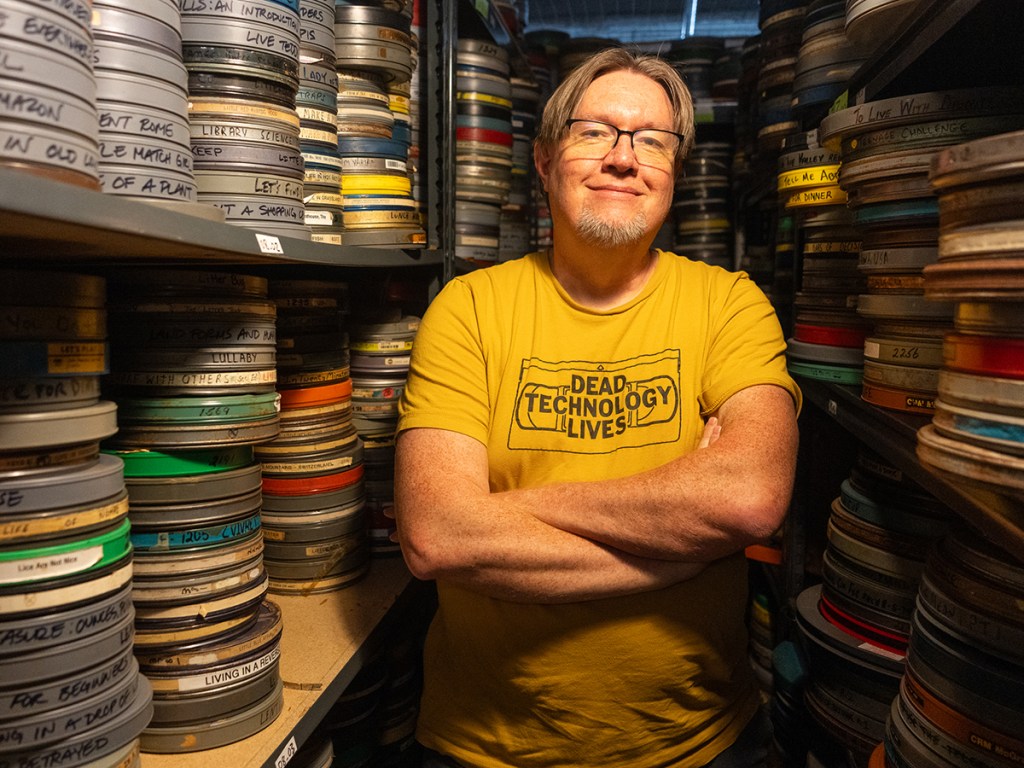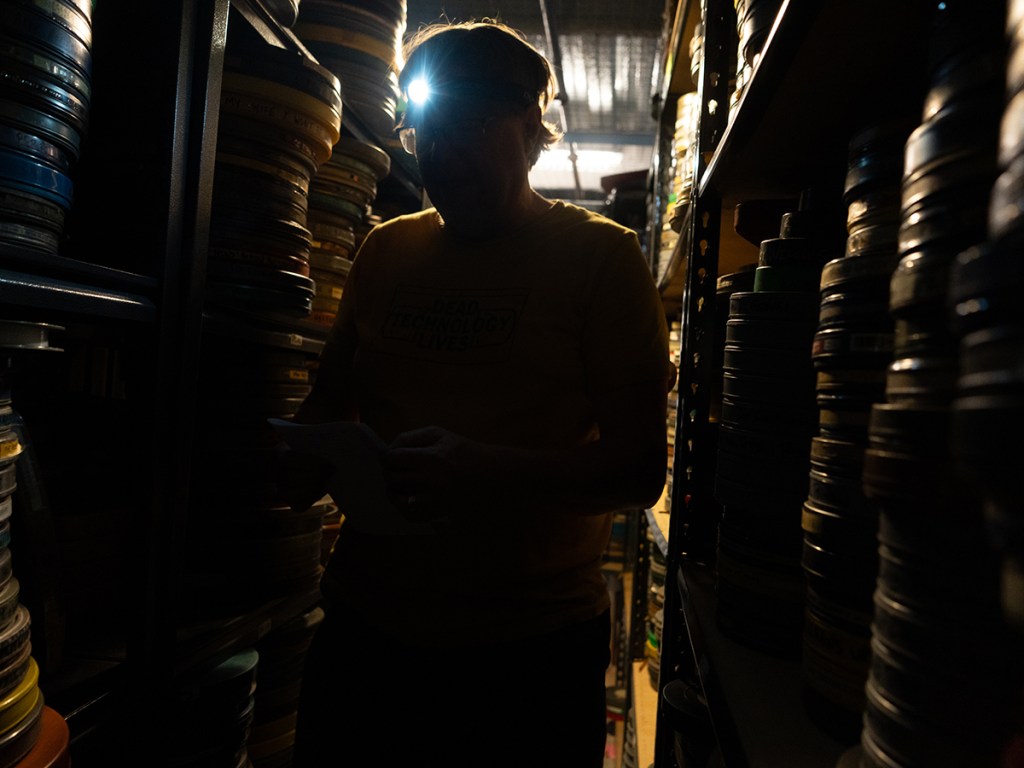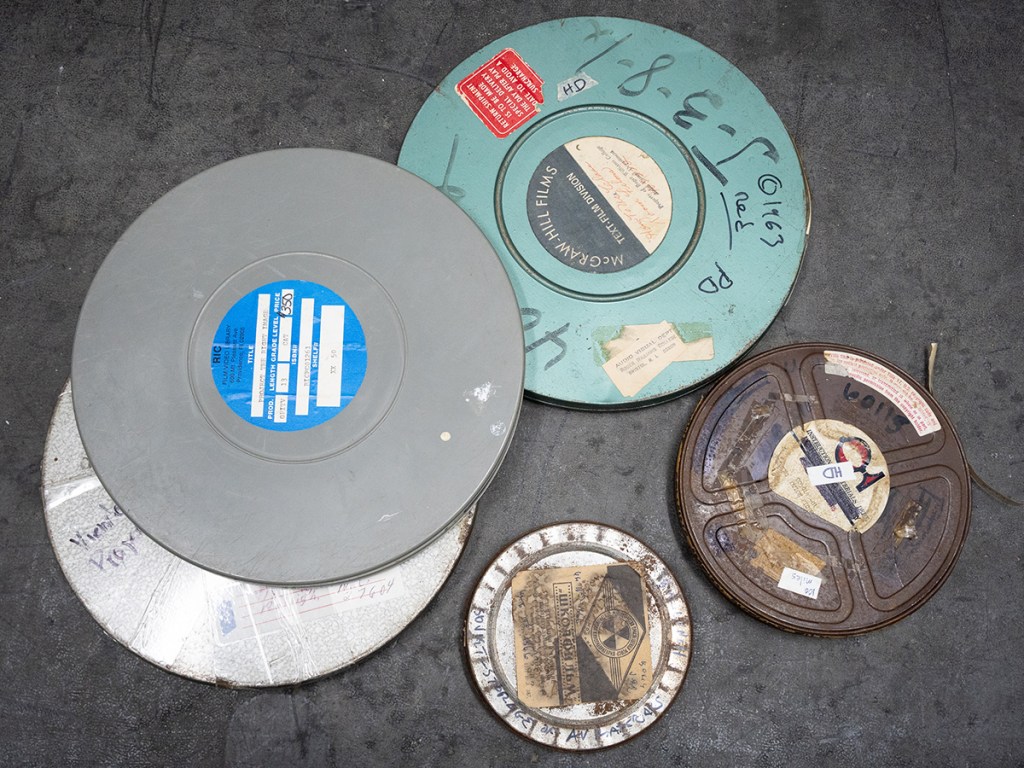Skip Elsheimer has thoughts about a lot of topics, and the properties of 16-millimeter educational films from the 1940s through the 1980s is definitely one such topic.
“People … are looking for things that they remember, that they’re nostalgic about, but also some people just like the vibe of an educational film,” he says. “You know, [the films are] very corny, but they also can be very tranquil and calming.”
Elsheimer would know. The archivist and audio-visual expert has a collection of 37,000 films stashed in a house in Southeast Raleigh and an additional seven storage units. The collection keeps growing, faster than Elsheimer can digitize all the video, and he keeps running out of space.
“It’s, like, tons and tons of metal reels and cans and film and … whenever I have to move a bunch of that stuff, I’m like, ‘Why am I doing this?,’ Elsheimer says. “I can put everything on a hard drive, and then it’s no problem. But there’s this balance. The balance is that physical media is important, but it’s not always convenient.”
Those who understand the balance of the importance of physical media will be in good company Saturday evening, when Elsheimer and other enthusiasts will converge at the Fruit in Durham for the “Let’s Get Physical” Media Night and Market physical media fest. There, vendors will sell a variety of vintage media items, from VHS and cassette tapes to CDs and vinyl records, CRT TVs to VCRs.
Elsheimer will be on hand screening some old films about media, just as he live streams old educational films from his archive on his YouTube channel, A/V Geeks 16mm Films, every day at lunchtime.
“I’m surprised which videos go viral,” Elsheimer says of the screenings, which, once uploaded, can rack up thousands of views over time.
A 1950s educational film about rabies was one of the most popular ever, so much so that Elsheimer decided to donate ad revenue he made off of showing the film to the World Rabies Foundation. Another popular video featured 30 minutes of silent footage of John Deere tractors. A particularly meaningful film documented a silversmith living in an Ethiopian village in the 1980s.
“I’ve had family members of his reach out to me and say, ‘Hey, this is amazing. Thanks so much for sharing this,” Elsheimer says.
An NC State University alumnus, Elsheimer has been collecting, digitizing, and showing films for nearly three decades, work that’s kept him plenty busy over the years. But he also finds time to host film screenings and Home Movie Day events across the Triangle, where people can bring in old film footage that might otherwise be lost, and get it digitized.
And Elsheimer was instrumental in bringing the Alamo Drafthouse Cinema to Raleigh. He worked there on programming as its “cultural adviser” and helped open its video rental store, Video Vortex, which now offers more than 70,000 VHS and DVD titles to rent for free. Its vibes are more VisArt, for those who remember, than Blockbuster, Elsheimer explains.
“[The store] is easily one of the largest collections of foreign DVDs in the United States,” he says (Elsheimer also opened video rental stores in Manhattan and Austin, Texas). “That’s television and movies, and documentaries, and all that stuff. But also, you know, it’s just a really awesome video store, probably one of the largest on the East Coast.”
Elsheimer estimates he’s digitized about 10 percent of his collection, “but it takes a lot of time and doesn’t always pay the bills,” he says. He’s made deals with some educational film companies that own the copyrights to the videos he collects, whereby he digitizes the video for free and splits revenue with the company on stock footage sales.
“That’s been lucrative,” he says. “It’s not something I can always count on, but it’s something that helps. … And then that stuff shows up in a really great documentary.”
Elsheimer is conscious about how market and political forces are shaping access in the digital age: big media companies and the government “are playing fast and loose with what they are making available, and they’re taking things away for different reasons,” Elsheimer says. He cites Warner Bros.’ recent decision to remove Looney Tunes from streaming services,
“All those classic cartoons from the ‘20s to the ‘50s, you can’t watch them,” he says. “And for me, that’s a loss, a sad loss, because I love those cartoons, love to revisit them. And so it’s a bummer.”
Elsheimer made a push recently to get 10,000 videos from his collection online. That’s work that he sees expanding over the next four years as the threat of censorship from the federal government looms.
“There’s films and videos that have keywords that are problematic with the current administration that I’m trying to get on the Internet Archive, onto YouTube, or the National Archives,” he says. “And that helps give eyeballs to it, because that’s part of it, right? Having all these films and rescuing them from dumpsters and landfills—that was part one. But if they’re sitting on a shelf and nobody’s seeing them, then it’s not really doing a good job. These films need to be seen. So that’s my next phase—how to give access to them?”
“Let’s Get Physical” Media Night and Market physical media fest takes place at The Fruit, 305 S. Dillard Street, on Saturday, May 3 from 5—11 p.m.
To comment on this story, email [email protected].



